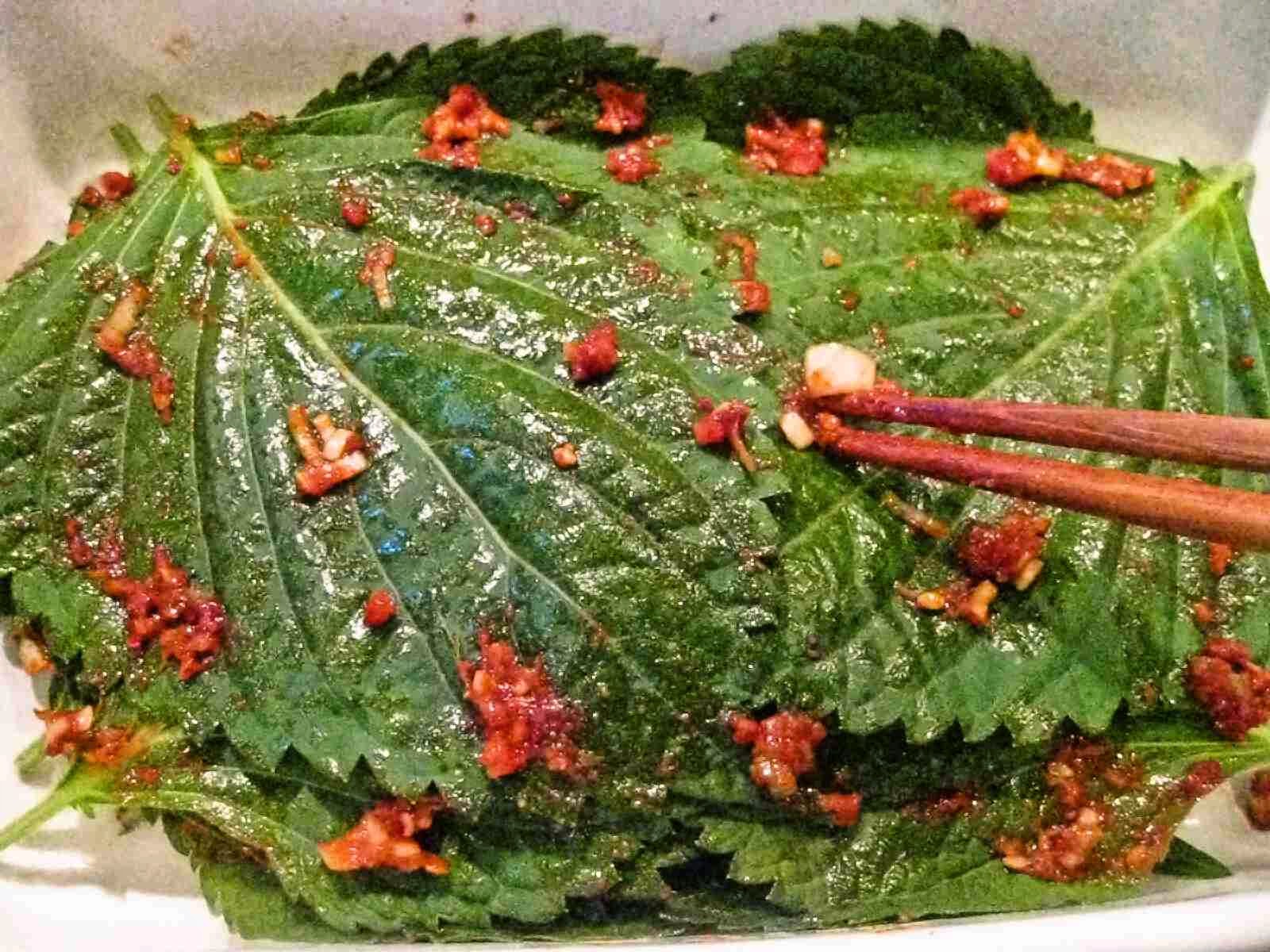This simple Korean pickle of egoma wild sesame leaves is a great companion for rice. While some people do not care for fresh egoma leaves, the pickling process nicely softens their distinctive aroma and taste, transforming this Korean shiso into an appetizing accent for everyday meals.
5 egoma leaves (1/8 of recipe):
26 calories; 1.0 g protein; 0.3 g fat; 4.3 g carbohydrate; 3.7 g net carbs; 75 mg sodium; 0 mg cholesterol; 0.6 g fiber
<Ingredients>
40-50 egoma wild sesame leaves (40 medium egoma leaves, 46 g in photo)
For kimchi marinade
2 tbsp shoyukoji soy sauce rice malt
2 tsp sake
2 tsp mirin
1/2 tsp rice vinegar
2 tsp Korean chili pepper flakes
2 tsp Korean chili pepper powder
10cm 1 thick or 2 skinny green onions (toward root end; 12 g in photo)
1/2-1 fresno pepper (20 g in photo)
2 cloves garlic
1 knob ginger (optional)
1 tsp white toasted sesame seeds
<Directions>
1.
Mix sake, mirin and rice vinegar, and microwave for 10-15 seconds to let out alcohol and excessive sourness.
2.
Grate garlic and ginger.
Finely chop green onion and fresno pepper.
3.
In a prep bowl, mix all ingredients for kimchi marinade.
4.
Wash egoma leaves, and pat dry individual leaves.
5.
Gently press both sides of each leaf (or a few leaves in a bundle) onto marinade, and place in container.
Put some marinade on top of layers from time to time.
After stacking all egoma leaves, put all remaining marinade around and on top of egoma leaves, cover, and refrigerate.
Best after two nights.
Day 3 (photo at left)
<Notes>
5 egoma leaves (1/8 of recipe):
26 calories; 1.0 g protein; 0.3 g fat; 4.3 g carbohydrate; 3.7 g net carbs; 75 mg sodium; 0 mg cholesterol; 0.6 g fiber
<Ingredients>
For kimchi marinade
2 tbsp shoyukoji soy sauce rice malt
2 tsp sake
2 tsp mirin
1/2 tsp rice vinegar
2 tsp Korean chili pepper flakes
2 tsp Korean chili pepper powder
10cm 1 thick or 2 skinny green onions (toward root end; 12 g in photo)
1/2-1 fresno pepper (20 g in photo)
2 cloves garlic
1 knob ginger (optional)
1 tsp white toasted sesame seeds
<Directions>
1.
Mix sake, mirin and rice vinegar, and microwave for 10-15 seconds to let out alcohol and excessive sourness.
2.
Grate garlic and ginger.
Finely chop green onion and fresno pepper.
3.
In a prep bowl, mix all ingredients for kimchi marinade.
4.
Wash egoma leaves, and pat dry individual leaves.
5.
Gently press both sides of each leaf (or a few leaves in a bundle) onto marinade, and place in container.
Put some marinade on top of layers from time to time.
After stacking all egoma leaves, put all remaining marinade around and on top of egoma leaves, cover, and refrigerate.
Best after two nights.
Day 3 (photo at left)
<Notes>
- This is only mildly picante.
- This keeps for weeks, but tastes best the first week while leaves are still fresh.
- Ginger adds a sharp note; without it, this tastes much milder.
- This is a great wrapper for steamed rice (photo at right).
- If shoyukoji is not available, use soy sauce. The sodium content for the whole recipe and for 5 leaves would be: 944mg and 118mg, respectively, using 50% reduced-sodium soy sauce; with regular soy sauce, 1,884mg and 236mg, respectively.
- Rice vinegar is added to give a tingling sensation that mimics salt, as shoyukoji has a mellower taste than soy sauce.
- Whole recipe above: 209 calories; 7.6 g protein; 2.5 g fat; 34.5 g carbohydrate; 29.4 g net carbs; 602 mg sodium (with shoyukoji made with 50% reduced-sodium soy sauce); 0 mg cholesterol; 5.1 g fiber
- 3 egoma leaves
(approx. 1/13 of recipe above) 16 calories; 0.6 g protein; 0.2 g fat; 2.6 g
carbohydrate; 2.2 g net carbs; 45 mg sodium; 0 mg cholesterol; 0.4 g fiber















No comments:
Post a Comment